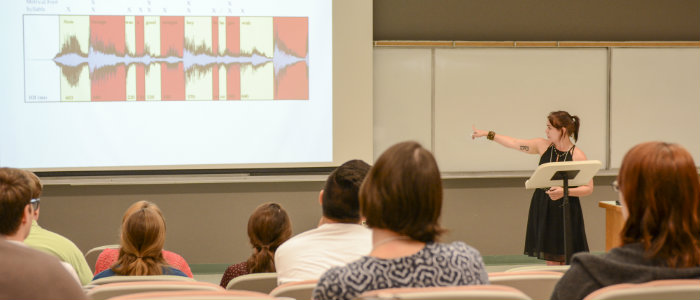PhD in Music Theory

Admission Requirements
- A Master's degree in Music Theory (or equivalent)
- Minimum 70% average in the Master's degree
Application Materials
- Two essays (3,500-5,000 words) that demonstrate the ability to articulate and carry out research in music theory
- A statement of interest
- Three confidential letters of reference
- Transcripts from all institutions attended, uploaded in PDF
- Proof of English language proficiency (if applicable)
Application Deadline: December 1
Timeline for Progression
| Year 1 | Year 2 | Year 3 | Year 4 | ||||||||
| Term 1 |
Term 2 |
Term 3 |
Term 4 |
Term 5 |
Term 6 |
Term 7 |
Term 8 |
Term 9 |
Term 10 |
Term 11 |
Term 12 |
| 4 half courses (or equivalent) |
2 half courses (or equivalent) |
Comp |
Dissertation Proposal Defence | Dissertation Research and Writing | |||||||
| Dissertation Proposal Development |
|||||||||||
Problems viewing on mobile? Click to view table
Notes:
- Course requirements must be completed in years 1 and 2, by the end of Term 5.
- Conceptualizing and developing a dissertation proposal begins in Term 3.
- A draft dissertation proposal should be completed in Term 7 with the approval of the dissertation supervisor and second reader.
- The Dissertation Proposal Defense should take place as early as possible in Year 3.
- This chart does not include the application for ethics approval (where applicable). The student and supervisor must plan accordingly.
Recent Courses Offered in Music Theory and Musicology
2024-2025
9520 Transformational Theory; instructor: Dr. Catherine Nolan
9526 Schenkerian Analysis: Small Forms; instructor: Dr. Peter Franck
9530 Contexts of Music Analysis; instructor: Dr. Catherine Nolan
9542 Special Topics: Posthuman Musical Futures; instructor: Dr. Kevin Mooney
9550 Opera: Don Giovanni: Texts and Commentary; instructor: Dr. Ed Goehring
9725 Introduction to Music Research; instructor: Dr. Ed Goehring
9739 Cognitive Musicology; instructor: Dr. Jonathan De Souza
9740 Research Creation: Studies in Songwriting; instructor: Dr. Robert Toft
2023-2024
9523 Special Topics: Listening in/to the Anthropocene; instructor: Dr. Kevin Mooney
9523 Special Topics: Topics in Late 20th Century Jazz; instructor: Dr. Peter Franck
9530 Contexts of Music Analysis; instructor: Dr. Catherine Nolan
9535 Research Creation: Covers; instructor: Dr. Robert Toft
9542 Special Topics in Musicology: Music and the Cold War; instructor: Dr. Emily Ansari
9550 Special Topics: The Magic Flute: Texts and Commentary; instructor: Dr. Ed Goehring
9725 Introduction to Music Research; instructor: Dr. Catherine Nolan
9749 Topics in Popular Music; instructor: Prof. Hannah Burge Luviano
2022-2023
9535 Special Topics: Composers and Their Autographs 1000-2000; instructor: Dr. James Grier.
9535 Special Topics: Research Creation; instructor: Dr. Robert Toft.
9542 Special Topics: Music and the Environment; instructor: Dr. Kevin Mooney.
9545 Pedagogy of Music Theory; instructor: Dr. Katie Walshaw.
9547 Popular Music Analysis and Production: Making Popular Music; instructor: Dr. Jay Hodgson.
9725 Introduction to Music Research; Dr. Ed Goehring.
9735 Special Topics in Musicology: Music and Trauma; instructor: Dr. Emily Ansari.
9739 Cognitive Musicology; instructor: Dr. Jonathan De Souza.
Directory of Current PhD Students
Recently Completed Dissertations
Contact Info
Associate Dean (Graduate Studies)
Kevin Mooney
TC 215
kmooney@uwo.ca
Graduate Program Assistant
Audrey Yardley-Jones
TC 216
519-661-2111 x85354
ayardley@uwo.ca


